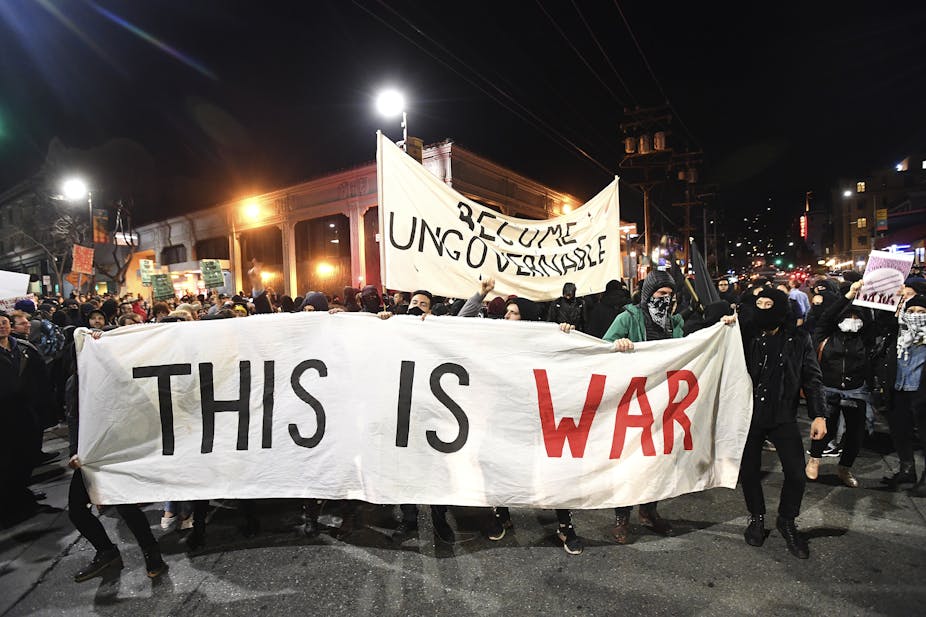“Sounds like someone I should get to know,” one observer quipped after he heard that Brietbart’s deputy editor, Milo Yiannopoloulos had been no-platformed by students at UC Berkeley. The university, which traditionally had a reputation for free-speech activism had just cancelled a campus address by the right-wing journalist after protesters mounted violent protests on campus.
Instead of silencing him, the no-platformers instead handed Yiannopoloulos the most coveted platform of all. The campus unrest made headlines, sending pre-sales for his new book “Dangerous” soaring. Suddenly Yiannopoloulos had become America’s poster boy victim of an oppressive left. Guardian columnist Matthew d'Ancona weighed in to support the Trump cheerleader’s freedom of speech.

Haven’t we been here before? In the UK, speakers such as Germaine Greer, Peter Tatchell and Julie Bindel – who, like them or loathe them, do have something to say about the world – have all become targets of no-platforming campaigns. Each time, the only result has been nationwide news coverage, generating platforms far more prominent than the humble campus ones they had originally been seeking.
Donald Trump’s response to the protest was predictably loud. In a tweet, he threatened to cut Berkeley’s funding, sending chills down many an academic’s spine. But even worse, the fiasco has actually made Trump right.
Trump’s tweet has further muddied the waters in America’s ongoing free speech debates. The First Amendment is written into the American DNA – but for many who view free speech as a tool of social awareness and activism, lining up on the same side as Trump and the alt-right seems anathema. I can’t help wondering whether Berkeley’s ragtag fringe of neo-cons plotted Yiannopoloulos’ invitation for no reason but to bask in the outrage that would follow.
It would otherwise have been just another – mostly unnoticed – evening of Yiannopoulos regurgitating his well-worn Trumpaganda. Then suddenly Berkeley’s right-thinking brigade had upgraded it to a coast-to-coast cause célèbre. No-platformers insist they are combating power hierarchies. But Berkeley’s no-platformers turned Yiannopoulos – not the world’s disempowered – into America’s victim of the week.
When you claim to be protesting in the name of the powerless, yet constantly end up handing victory to the people in power, maybe you need to rethink your strategy. I’m not saying the students ought to shut up and give in. To the contrary, vocal opposition is needed in the US more than ever. The problem lies not with the protesters’ act of dissent, but with their aim. The students (and more than one of their professors) were not simply trying to put forth the right message. Their goal was to censor the wrong message.
Real power
Despite the anxieties of the no-platformers, only rarely are guest speakers the moguls of real political or social power. The world’s top corporate executives, for example, rarely accept invitations to speak in universities. It’s not that they’re too busy, but if some Exxon, Monsanto, or McDonald’s CEO were announced as a featured speaker every socially conscious student on campus would be posting on Twitter and Facebook, and holding discussions late into the night – and rightly so – about the catalogues of the company’s misdeeds committed since the day it first drew breath.
That’s how real power works: not by confronting public scrutiny, but by eschewing it. The masters of the universe don’t claw their way to the top by reciting the joys of global dominance to snorting undergraduates. On the contrary, the truly powerful rule the world by shunning exposure.
Would that the world’s power-mongers did check in from time to time at their local student debating club. If we think universities are places for critical scrutiny of ideas, then it’s not so much tragedy as sheer farce that some no-platforming campaign would demand their cancellation “because they’re too powerful”.
Wielding power is the very reason people ought to be invited. If students are unable to turn up and ask challenging questions, rather than just kicking and screaming about oppression, then what are they even doing at university? And more importantly, what on earth do they think they’re accomplishing for the world’s oppressed?
It’s lame to brand people “snowflakes” for raising vital social concerns. But it’s lamer for the targets of that sneer to turn it into a truth.

